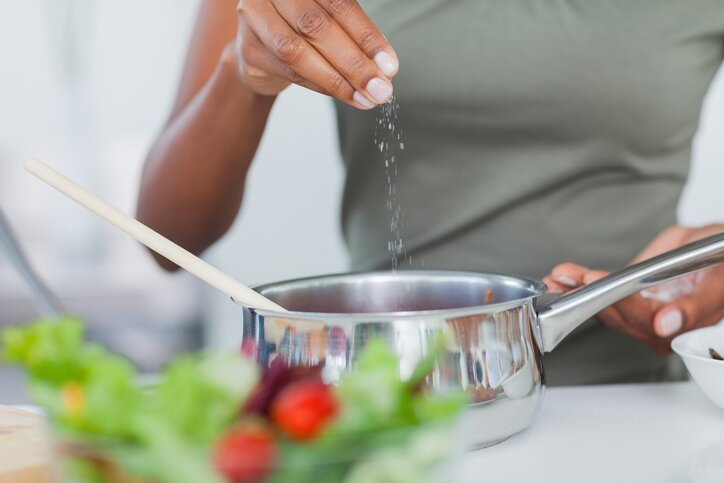Avoiding Hidden Sodium: Seven Strategies to Improve Your Diet
Consuming too much sodium can cause high blood pressure, heart attacks, stroke, kidney disease, and other health issues.
The U.S. Dietary Guidelines recommend consuming less than 2,300 mg of sodium per day. And if you’re over 51, African American, or have high blood pressure, chronic kidney disease, or diabetes, you should limit it to less than 1,500 mg. But according to the USDA’s Center for Nutrition Policy and Promotion, the estimated average intake of sodium for Americans is a whopping 3,400 mg per day! Salt lurks everywhere, even in foods that you might not suspect, like bread and milk.
Here are some easy ways to reduce the sodium in your diet.

Limit your intake of processed foods.
The American Heart Association (AHA) reports that 75% of the sodium in the average American diet comes from salt added to processed foods, so think twice before buying those hot dogs and chips. Here are some of the worst offenders:
- Frozen meals: These pre-made, microwaveable meals are loaded with sodium. Some have more than 1,500 mg of sodium each, as well as sugar, unhealthy fats, preservatives, and artificial colors and flavors.
- Canned soup: Conventional canned soups often contain more than 900 mg of salt per cup, so it’s best to make your own or purchase the lower-sodium varieties.
- Deli meats: Processed and cured meats account for 10% of the American food supply. These products are packed with sodium, often in the dangerous form of sodium nitrate, a carcinogenic preservative. Avoid deli meats altogether or look for nitrate-free varieties.
- Canned vegetables: Some canned vegetables can contain as much as 500 mg of sodium per serving! It’s best to buy fresh or frozen vegetables, if possible. If you do opt for the canned variety, read the labels carefully and choose low-sodium or no-salt-added options.
Watch your portion sizes.
If you choose to consume high-sodium foods like pickles, cheese, snacks, or olives, stick to a small amount. Opt for a few pretzels rather than downing the entire bag.
Compare brands.
Similar foods can contain very different levels of sodium. Choose the one with the lowest amount. Some brands may carry low sodium versions, too.
Dine at home.
Most restaurant food packs a serious salt punch. Research nutritional information online, if possible, to make the best choices. By cooking most of your meals at home, you can control the level of salt that’s added.
Rinse canned foods.
Canned vegetables and beans tend to be salt-laden in order to extend their shelf life. By running canned veggies underwater, you can remove about 40 percent of their sodium. Better yet, choose non-salted versions when possible.
Experiment with other flavors.
Herbs and spices can add extra oomph to your meals and come with disease-fighting antioxidants, to boot. Garlic, lemon juice, and pepper are among the many tasty options that can add zest to your food without the damaging effects of sodium.
Balance the negative effects of sodium.
Eating foods high in potassium such as fresh fruit, vegetables, low-fat dairy, and legumes, can help flush excess sodium from your body. Beets, bananas, potatoes, and avocados, for example, are all rich sources of potassium.
Batchelor Brothers Funeral Services is proud to offer helpful resources, useful tools, and compassionate care. If we can be of assistance in any way, please contact us.
About Batchelor Brothers Funeral Services: As a leading African American-owned and operated funeral and cremation organization, Batchelor Brothers Funeral Services has provided a ministry of care to thousands of grieving families. We promise to provide our highest level of distinguished service and respect to families who entrust us to honor their loved ones. With two convenient locations serving North and West Philadelphia, it is always our pleasure to be of service. For more information about our funeral, cremation, memorial, and repast services, please visit batchelorbrothers.com.







Comments